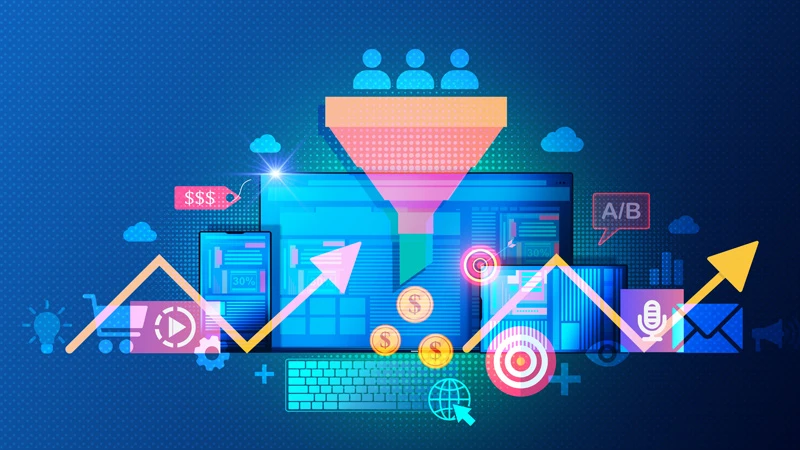Reinvent Your Service: Just How AI Automation Is Changing B2B Operations
AI automation is reshaping B2B operations in significant methods. Business are adopting this modern technology to improve workflows and improve performance. As tasks come to be automated, companies can concentrate on critical development instead of ordinary processes. The ramifications of these adjustments are extensive, affecting every little thing from consumer interactions to provide chain management. Understanding this transformation is necessary, as the future of service depend upon the efficient assimilation of AI right into daily operations. What exists in advance in this evolving landscape?
Recognizing AI Automation in B2B Context
As businesses increasingly seek performance, recognizing AI automation within the B2B context ends up being important. AI automation describes the application of artificial knowledge modern technologies to simplify and improve organization procedures. In B2B settings, this can show up in different kinds, such as automating data entrance, enhancing supply chain logistics, or boosting supply monitoring. Organizations leveraging AI automation can minimize functional prices, lessen human mistake, and increase efficiency. AI devices can analyze substantial quantities of data to give workable insights, allowing educated decision-making. The integration of AI into B2B operations not just changes traditional process however likewise cultivates dexterity and scalability, permitting organizations to adjust to market changes swiftly and successfully. Embracing this innovation is necessary for remaining affordable in today's electronic landscape
Enhancing Customer Experience With AI
Exactly how can AI change client communications in the B2B market? AI enhances client experience by giving individualized, timely, and effective service. Digital aides and smart chatbots can manage queries 24/7, making certain customers get prompt actions. Growth Systems For B2B. Predictive analytics make it possible for organizations to prepare for consumer demands, tailoring offerings appropriately. AI-driven systems can evaluate customer data, enabling targeted advertising and marketing approaches and boosted involvement. Furthermore, sentiment evaluation tools evaluate customer responses, assisting companies tweak their services. By automating regular tasks, AI maximizes personnels to concentrate on high-value interactions, fostering more powerful partnerships. The combination of AI not only simplifies communication yet likewise constructs count on and commitment, ultimately raising the overall consumer experience in the competitive B2B landscape

Improving Supply Chain Management With AI
AI plays a necessary function in optimizing supply chain monitoring through anticipating analytics and automated inventory control. By leveraging anticipating analytics, businesses can prepare for demand variations and change their procedures as necessary. Automated supply systems better improve performance by guaranteeing stock degrees are maintained, reducing waste and enhancing total efficiency.
Predictive Analytics Benefits
While numerous organizations encounter challenges in managing complicated supply chains, anticipating analytics provides a transformative solution by leveraging large amounts of information to forecast trends and maximize operations. By assessing historical information along with real-time inputs, anticipating analytics allows companies to recognize patterns and expect future demands. This foresight enables more informed decision-making, boosting efficiency and minimizing prices. In addition, organizations can proactively resolve prospective disturbances by forecasting supply chain traffic jams and readjusting approaches accordingly. The assimilation of predictive analytics not just boosts inventory management but likewise promotes more powerful connections with suppliers and customers via prompt responses to market shifts. Ultimately, the adoption of anticipating analytics encourages companies to stay affordable in an increasingly dynamic service setting.
Automated Supply Control
As companies increasingly rely on anticipating analytics to enhance supply chain operations, automated supply control becomes an effective ally in this initiative. By leveraging AI-driven technologies, companies can improve precision in supply tracking, minimize stockouts, and minimize excess supply. Automated systems assess real-time information, permitting services to forecast need variations and adjust stock levels as necessary. This not only simplifies order satisfaction however additionally improves money circulation management by minimizing holding costs. In addition, AI can determine patterns in purchasing behavior, allowing even more educated decision-making relating to distributor connections and procurement approaches. Inevitably, automated stock control not only enhances operational efficiency yet likewise boosts client satisfaction by making certain product schedule, solidifying its role as an essential element in modern supply chain monitoring.
Data-Driven Decision Making Powered by AI
In today's affordable landscape, organizations increasingly count on data-driven decision-making to enhance operational effectiveness and tactical preparation. Expert system plays a pivotal function in this transformation by examining vast quantities of data quickly and properly. AI algorithms recognize patterns, trends, and abnormalities that human experts may overlook, enabling services to make informed choices based on real-time insights. This ability allows business to forecast market shifts, optimize source allowance, and customize their offerings to consumer needs. Furthermore, AI-driven analytics facilitate risk evaluation and monitoring, ensuring that organizations can browse unpredictabilities effectively. By leveraging these sophisticated devices, organizations not just improve their decision-making processes however additionally obtain an affordable benefit in their respective markets, cultivating development and innovation.
Automating Repeated Jobs to Increase Performance

Incorporating AI With Existing Business Processes
Many companies deal with challenges when incorporating AI with existing service procedures. These obstacles commonly come from an absence of recognizing regarding how AI can match present process. Effective integration calls for a comprehensive analysis of existing procedures to determine areas where AI can include worth. Organizations needs to additionally assure that their groups are furnished with the essential abilities to utilize AI devices successfully. On top of that, seamless integration hinges on the compatibility of AI technologies with heritage systems. Business commonly discover it useful to adopt a phased method, piloting AI applications in certain departments before a more comprehensive rollout. This approach enables modifications based on first responses, ensuring smoother changes and taking full advantage of the potential advantages of AI automation in improving productivity and performance.
Future Patterns in AI Automation for B2B Firms
As B2B business want to the future, boosted data analytics is readied to play a crucial function in driving decision-making procedures. Intelligent process automation will certainly likewise become an essential trend, enhancing operations and boosting efficiency. These innovations guarantee to reshape exactly how organizations operate, inevitably resulting in even more active and receptive companies.
Boosted Data Analytics
While businesses significantly rely upon data-driven choices, the duty of AI in enhancing data analytics is ending up being much more important in B2B operations. AI technologies promote the collection and evaluation of large datasets, enabling business to reveal beneficial insights that drive strategic planning. Anticipating analytics powered by AI permits organizations to forecast market patterns and client actions with better accuracy. Furthermore, equipment knowing formulas improve information analysis, recognizing patterns that human experts may overlook. This leads to more enlightened decision-making and enhanced source appropriation - Minarik AI. As B2B business proceed to accept AI-driven analytics, they can anticipate improved functional efficiency, boosted customer experiences, and an affordable edge in the marketplace. The future of data analytics in B2B depends upon integrating innovative AI abilities
Smart Process Automation
Intelligent Refine Automation (IPA) is poised to reinvent B2B procedures by perfectly incorporating AI technologies with standard business processes. This ingenious strategy integrates robot procedure automation (RPA) with innovative AI abilities, making it possible for companies to enhance performance and precision. Firms can automate repeated tasks, such as data entrance and invoice processing, enabling employees to concentrate on tactical efforts. IPA additionally leverages artificial intelligence and all-natural language handling, boosting decision-making via real-time data evaluation. As companies progressively take on IPA, they can expect significant cost decreases and improved client experiences. Future fads suggest an expanding see this page reliance on IPA for scalability and versatility, placing companies to grow in an ever-evolving industry. Embracing IPA will be crucial for keeping competition in the electronic age.
Regularly Asked Inquiries
What Industries Advantage Most From AI Automation in B2B Operations?
Production, logistics, money, and healthcare industries benefit most from AI automation in B2B procedures. These fields take advantage of automation to improve performance, lower prices, streamline processes, and boost decision-making with data-driven understandings and anticipating analytics.
How Can Small Companies Execute AI Automation Efficiently?
Small companies can implement AI automation properly by recognizing recurring tasks, selecting appropriate devices, integrating solutions gradually, educating staff, and constantly examining performance to maximize processes, making the most of and making sure a smooth changeover performance. AI Automation For B2B.
What Are the Costs Related To AI Automation Application?
The expenses connected with AI automation application normally consist of software application procurement, facilities upgrades, training team, ongoing upkeep, and possible consultation costs. These expenses can differ significantly based upon the scale and complexity of the automation services picked.
Exactly how Do I Measure ROI From AI Automation Initiatives?
To determine ROI from AI automation initiatives, one ought to examine expense financial savings, performance improvements, and revenue development versus execution prices. Tracking key efficiency signs with time gives valuable insights into performance and overall roi.
What Skills Are Required to Manage AI Automation Projects?
Effective management of AI automation tasks calls for abilities in task administration, information analysis, programs, and understanding AI innovations. Additionally, strong interaction, analytic capacities, and flexibility are necessary for maneuvering the complexities of such campaigns.
As services increasingly seek performance, understanding AI automation within the B2B context becomes crucial. The combination of AI into B2B operations not just transforms typical process but also promotes agility and scalability, permitting businesses to adjust to market adjustments promptly and successfully. While services progressively depend on data-driven decisions, the role of AI in boosting information analytics is ending up being a lot more necessary in B2B procedures. Smart Process Automation (IPA) is positioned to revolutionize B2B operations by perfectly incorporating AI innovations with traditional organization procedures. Efficient monitoring of AI automation jobs needs skills in job management, information evaluation, programming, and recognizing AI technologies.